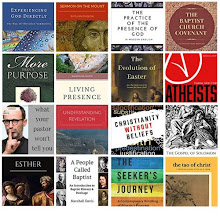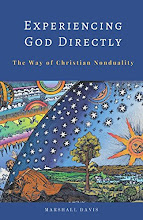I recently began
reading through the New Testament - again – for the umpteenth time – one
chapter a day during my morning devotions. Today I came to the thirteenth
chapter of the Gospel of Mark, known to scholars as the Little Apocalypse, also
known as the Olivet Discourse, which has parallels in the Gospels of Matthew
and Luke.
It is one of several places in scripture – the most famous
being the Book of Revelation - that speak of the end of the world as we know it.
The Kingdom of God breaks into history with cataclysmic events, ushered in by a
heavenly figure known as the Son of Man, which Christians later came to
identify as the Second Coming of Christ.
It says in part: “But
in those days, after that tribulation, the sun will be darkened, and the moon
will not give its light, and the stars will be falling from heaven, and the
powers in the heavens will be shaken. And then they will see the Son of Man
coming in clouds with great power and glory. And then he will send out the angels
and gather his elect from the four winds, from the ends of the earth to the
ends of heaven. From the fig tree learn its lesson: as soon as its branch
becomes tender and puts out its leaves, you know that summer is near. So also,
when you see these things taking place, you know that he is near, at the very
gates. Truly, I say to you, this generation will not pass away until all these
things take place. Heaven and earth will pass away, but my words will not pass
away.” (13:24-31)
There is a lot more to it, and I encourage you to read the
whole chapter,
but this is the most dramatic part. When this teaching is read in the context
of Jesus’ primary message about the coming of the Kingdom of God (“Repent, for
the Kingdom of God is at hand!), it has led many scholars to think that Jesus was,
first and foremost, an apocalyptic prophet.
Some say Jesus was a failed apocalyptic prophet because the
eschatological events he predicted (in particular, a visible coming of the Son
of Man in the clouds) did not happen within that generation. According to the
parallel passage in Matthew, he made it clear that all these events would
happen within the lifetime of his hearers. “Truly, I say to you, there are some
standing here who will not taste death until they see the Son of Man coming in
his kingdom.” (Matthew 16:28)
If Jesus got this wrong, that would make him a false prophet
according to biblical standards: “But the
prophet who presumes to speak a word in my name that I have not commanded him
to speak, … that same prophet shall die. And if you say in your heart, ‘How may
we know the word that the Lord has not spoken?’ — when a prophet speaks in the
name of the Lord, if the word does not come to pass or come true, that is a
word that the Lord has not spoken; the prophet has spoken it presumptuously.
You need not be afraid of him.” (Deuteronomy 18:20-22)
That would put a whole new perspective on Jesus’ execution. The
idea that Jesus’ prophecy was erroneous is unthinkable for Christians. So for
two thousand years, Christians have employed clever hermeneutics to explain the
apparent failure of Jesus’ prediction. But
today as I read this passage again, it made sense to me. What Jesus said was
true.
I have witnessed what Jesus describes. Not literally, of
course. I am not prone to revelatory visions, angelic sightings or
hallucinations. History seems to go on as it always has. Yet Jesus’ words - when
they are reads as symbolic - ring true of my experience. There has been a
dramatic shift in seeing. The world (as people normally understand it) is no
more. The apocalypse (which means “unveiling”) is a reality now. The unveiling
began in Jesus’ day and has been happening for many of his disciples ever since.
When eyes are opened to the One behind this shadow play of
time and space, the universe as we know it dissolves. It is more accurate to
say that the universe is shown to be all there is. (The word “universe’ breaks
down into the Latin words uni=one + versus=turned; universe means “turned into
one.”) The universe is seen as a seamless whole because that is what it has always
been. Distinctions vanish.
The heavens and the earth pass away. The facade of the
universe is rolled back to reveal Reality. The Son of Man appears, and we are one
with Him. What Jesus was describing in this dramatic apocalyptic passage is not
a cataclysmic end of history or the physical dissolution of the cosmos. Jesus
is describing a spiritual awakening to the true nature of the universe.
Jesus was not an apocalyptic prophet so much as a visionary
and mystic who could see what others do not see. And he invites us to share his
vision. That is why he ends his Little Apocalypse by repeatedly saying, “Awake!”
and “Stay awake!” (The Greek verb used in Mark 13:35-37 can mean both.) So let’s
do what he says. “Wake up! The Kingdom of God is at hand!”



















